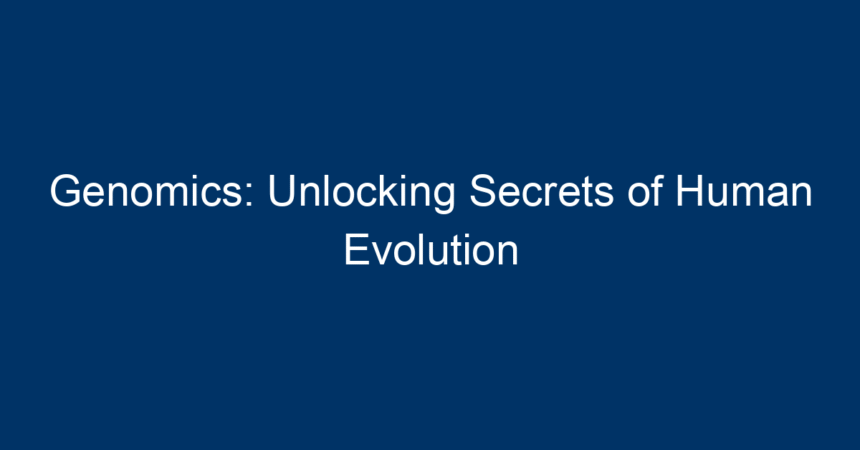Genomics is revolutionizing our understanding of human evolution, providing unprecedented insights into our origins, biological diversity, and adaptability. By unraveling the intricate codes of our DNA, scientists are beginning to piece together the complex puzzle of how we came to be the species we are today. This article will explore what genomics is, its significance in the study of human evolution, and the potential it holds for future discoveries.
Understanding Genomics
What is Genomics?
Genomics is a branch of molecular biology that focuses on the structure, function, evolution, and mapping of genomes. A genome is the complete set of DNA in an organism, which includes all of its genes. Unlike genetics, which studies individual genes and their roles in inheritance, genomics looks at the entire genome, making it possible to understand genetic relationships on a grand scale.
The Rise of Genomics
The Human Genome Project, launched in 1990 and completed in 2003, marked a significant milestone in genomics. This international research effort aimed to map the entire human genome and paved the way for advances in sequencing technologies. The project not only deciphered the human genetic code but also set the stage for subsequent studies in evolution, personalized medicine, and biotechnology.
Genomics and Human Evolution
Tracing Our Ancestry
Genomics plays a vital role in tracing human ancestry. By comparing the genomes of modern humans with those of our closest relatives—such as Neanderthals and Denisovans—scientists can identify genetic differences and similarities. These comparisons help us understand how these ancient hominins contributed to our genetic makeup through interbreeding, revealing a more complex picture of human evolution than previously thought.
For example, recent studies show that many people of non-African descent carry a small percentage of Neanderthal DNA. This interbreeding suggests that as modern humans migrated out of Africa, they encountered and mated with local hominin populations, integrating their genetic traits.
Unraveling Adaptive Traits
Genomics allows researchers to investigate adaptive traits that may have conferred advantages to early humans in different environments. For instance, genes associated with skin color and resistance to diseases vary greatly among populations that have lived in different geographical regions. This phenomenon, known as natural selection, is evident in genomic studies that analyze how early humans adapted to varying levels of UV radiation or local pathogens.
The discovery of the APOE gene, which influences cholesterol metabolism and is linked to cardiovascular disease, illustrates how genomics can shed light on health traits that may have played a role in human survival and reproduction.
Revealing Migration Patterns
Genomics is crucial in mapping human migration patterns, enhancing our understanding of how humans spread across the globe. Using a combination of modern genomic data and ancient DNA samples, researchers can trace the paths our ancestors took, the timing of their movements, and the environmental factors that influenced these migrations.
For instance, genomic studies have pinpointed the routes taken by early humans as they migrated from Africa to Europe and Asia. This information enhances our understanding of how climate changes and geographical barriers shaped human populations over thousands of years.
The Role of Genomics in Modern Research
Disease Susceptibility
One of the prominent areas where genomics intersects with evolution is in the study of disease susceptibility. Understanding the genetic factors that contribute to certain diseases can help scientists trace human evolution’s impact on our health.
For example, the Sickle Cell gene, prevalent in regions where malaria is common, illustrates how human populations adapt genetically to disease pressures. By studying such adaptations, researchers can better comprehend how ancient environmental challenges continue to shape health outcomes today.
Personalized Medicine and Genomics
Advancements in genomics have led to the emergence of personalized medicine. By analyzing an individual’s genome, healthcare providers can identify genetic variants that influence drug responses, disease susceptibilities, and treatment options. This tailored approach to healthcare can lead to more effective therapies and improved health outcomes.
Ethical Considerations
As we delve deeper into genomics and human evolution, ethical considerations become paramount. Issues surrounding privacy, consent, and the potential for genetic discrimination must be addressed. Open discussions among scientists, ethicists, and the public will be essential in navigating the complexities of genomic research.
Actionable Insights for the Future
Embrace Genetic Education
Understanding genomics and its implications on human evolution is essential for everyone. Educational programs focused on genetics and its relevance in our daily lives can empower individuals to comprehend the significance of personal genomic information.
Advocate for Ethical Standards
As genomic science progresses, advocating for ethical standards in research and clinical applications is vital. Support organizations that prioritize ethical guidelines to ensure the responsible use of genomics in improving health outcomes.
Explore Your Genetic Heritage
With the increasing availability of consumer genetic testing, individuals can explore their ancestral roots. By understanding one’s genetic heritage, you can gain insights into historical migration patterns, ancestry, and even health traits influenced by evolution.
Stay Informed on Genomic Research
Keeping up-to-date with the latest findings in genomic research can provide a deeper understanding of anthropology, human history, and our biological future. Subscribe to scientific journals, attend seminars, or engage with online courses to continue learning.
Conclusion
Genomics is a powerful tool that opens doors to understanding human evolution in ways previously unimaginable. As we unlock the secrets of our DNA, we not only learn about our past but also gain insights that can shape our future, from health and disease to social structures. By embracing genomics, advocating for ethical practices, and seeking knowledge, we can equip ourselves to navigate the evolving landscape of genetics, fostering a better understanding of what it means to be human.




